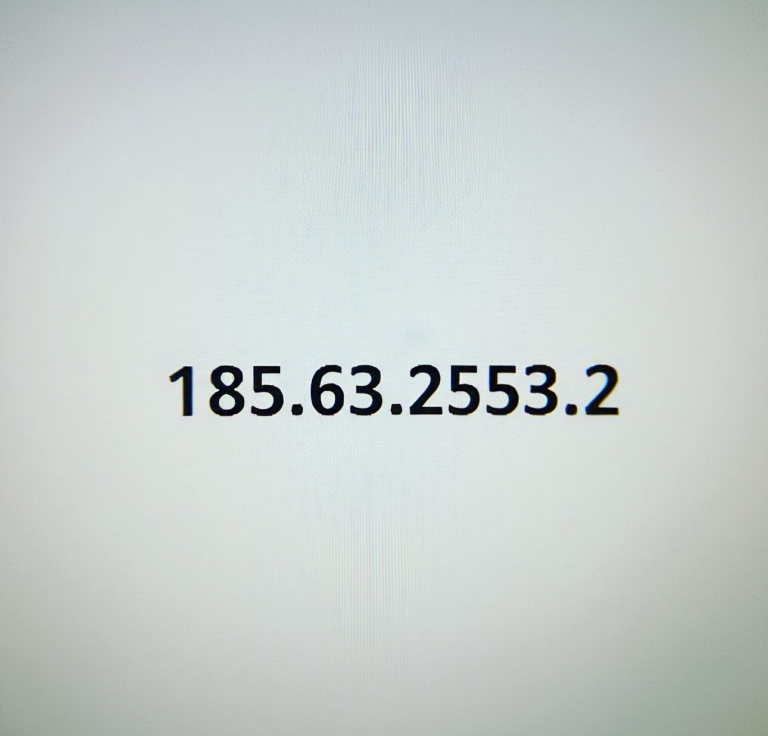Introduction to 185.63.253.2pp – What It Means
The key-word 185.63.253.2pp may also appear to be a mysterious string of numbers and characters, but for people who are deep into network control, cybersecurity, or private server configurations, this time period can hold severe importance. At first look, 185.Sixty three.253.2 seems to be a public IP deal with — which it’s far — however the attached “pp” suffix is in which matters come to be exciting and probably significant. When coping with virtual infrastructure, uncommon extensions or appended characters frequently advocate custom configurations, proprietary platforms, VPN gateway references, or personal get right of entry to points. In this newsletter, we can uncover the information of 185.Sixty three.253.2pp, how it’d relate to virtual personal networks (VPNs), proxy structures, records privateness frameworks, and server-facet routing.
Understanding what 185.63.253.2pp should constitute is essential for builders, IT administrators, researchers, or even regular internet customers who need better perception into how stable or hidden systems are deployed online. We’ll dive into possible interpretations, use instances, protection dangers, and equipment to help you determine whether or not this string poses relevance in your activities or systems. Whether you’re exploring cyber gear, trying to discover assets of suspicious visitors, or configuring your own systems, this manual will offer large clarity on the subject. By the end of this newsletter, you may be well-ready with each the technical know-how and practical information to engage with 185.Sixty three.253.2pp accurately.
🔷 IP Address Anatomy: Breaking Down 185.63.253.2When inspecting 185.63.253.2pp, the first component we should isolate is the 185.Sixty three.253.2, which is a widespread IPv4 address. IP addresses inside the 185.Zero.0.Zero – 185.255.255.255 variety are commonly used by facts facilities, VPN providers, and cloud computing systems across Europe and components of Asia. This block is commonly related to commercial enterprise-grade web hosting offerings or anonymized routing infrastructure. In truth, a couple of cybersecurity gear categorize such IP levels as “business proxies” or “VPN exit nodes.” This manner when you have observed this IP on your visitors logs or on line activities, you is probably handling both a bot, a cloaked user, or a server running privateness-targeted offerings.
The presence of an IPv4 address suggests traceable hobby, but no longer always transparently. IPs like 185.63.253.2 can rotate, alternate ownership, or be rerouted the use of tunneling protocols which includes OpenVPN, IKEv2, or WireGuard. Knowing the function of this deal with can assist tell your approach to chance prevention or overall performance evaluation. If you’re a webmaster or IT professional, identifying visitors from IPs like these would possibly boost purple flags depending at the supply or conduct of incoming requests. It is probably indicative of trying out servers, DDoS bots, or cloaked API calls. That said, the wide variety on my own does not verify malicious intent — it’s about context and utilization.
🔷 What Does the “pp” in 185.63.253.2pp Indicate?
The “pp” suffix on 185.63.253.2pp is not an average preferred for any recognised IP addressing scheme — it’s no longer a part of IPv4 or IPv6 systems. Instead, this pattern frequently appears in custom software program environments, VPN configurations, or pseudo-domains used internally inside equipment or proprietary dashboards. In sure environments, specifically in VPN customers or firewall logs, the suffix may be used to reference a selected protocol (e.G., Private Proxy, Personal Proxy, or Peer Proxy). These tags help outline the behavior of the IP connection, as opposed to modify the IP itself.
For instance, a cybersecurity platform might log “185.Sixty three.253.2pp” to signify that this IP cope with is working under a Private Proxy rule or is configured for Peer-to-Peer Protocol tunneling. If this turned into visible in net server logs or firewall access controls, the “pp” should recommend the form of provider connecting in your system. Similarly, a few businesses append identifiers to raw IP addresses so one can simplify routing instructions or create internal references for community operations. Therefore, 185.Sixty three.253.2pp may not be some thing you may ping or go to — but it is able to preserve full-size backend meaning.
🔷 VPN and Proxy Implications of 185.63.253.2pp
When we study the manner cutting-edge digital non-public networks operate, IP addresses like 185.Sixty three.253.2pp often play a foundational position. A VPN hides your real IP and assigns a far off one — generally from a pool of public addresses — which include 185.63.253.2. When paired with something like “pp,” the machine is probably labeling it as a proxy-enabled port or a privatized connection course. In VPN offerings that use TCP/UDP tunneling, a modified label like 185.Sixty three.253.2pp enables pick out which go out node or vicinity the information is passing through. This is specially common in apps that allow multi-hop configurations (i.E., routing thru multiple encrypted nodes).
Furthermore, VPN providers often customize their logs and get right of entry to manipulate systems to append readable flags to their IPs for less complicated diagnostics. So, while you see “pp,” it can suggest: “personal peer,” “protection protocol,” or even “top class proxy.” It’s now not intended for browser interpretation, but instead for device-stage tracking. As cybersecurity threats evolve, such conventions permit for higher manage and visibility throughout multiple faraway locations. Therefore, in case you’re the usage of business enterprise VPNs or smart routing structures, encountering some thing like 185.63.253.2pp is extra approximately backend intelligence than floor-stage browsing.
🔷 Use Cases of 185.63.253.2pp in Cybersecurity
In today’s cybersecurity environment, IP labels like 185.Sixty three.253.2pp would possibly appear in log tracking tools, intrusion detection structures, or network forensics platforms. These styles of labels can assist analysts differentiate among hazard vectors. For instance, a connection marked as 185.Sixty three.253.2pp may sign that the IP originated from a acknowledged proxy or changed into attempting to bypass firewall regulations. It could also recommend the IP changed into tagged by using your inner tracking system as “potentially personal,” which might require further evaluation earlier than granting or blocking access.
For corporations that manipulate touchy records or offer stable APIs, the ability to understand anonymized connections is vital. Malicious actors frequently make use of proxy IPs to masks their vicinity or automate scraping activities. Therefore, information whether 185.63.253.2pp is part of an allowed list or an anomaly may want to shield towards brute-pressure attacks or fraudulent logins. Advanced firewall answers can be programmed to vehicle-flag suffix patterns like “pp” for deeper inspection or isolation.
🔷 Common Scenarios Where 185.63.253.2pp Might Appear
Here are some real-world scenarios where the string 185.63.253.2pp might show up:
- VPN Logs: While using a third-party VPN, the log entries might list 185.63.253.2pp as a masked endpoint.
- Proxy Lists: A proxy service may list this address under their premium or peer-to-peer section.
- Firewall Alerts: Custom tagging in security platforms might use “pp” to define a particular policy group.
- Web Analytics: Suspicious traffic in your dashboard might show this string if it came from masked origins.
- Network Tools: Traceroute or NetFlow reports might show this IP if it’s part of a rerouting system or CDN edge node.
These occurrences might not always mean danger, but they highlight the importance of tracing and verifying traffic origins in a digital world where anonymity is easy to obtain.
🔷 Tools to Investigate 185.63.253.2pp
You can employ a couple of gear to assess what 185.63.253.2pp may represent or how it behaves for your environment. Begin with IP research services like AbuseIPDB, IPinfo.Io, or VirusTotal to hint the general public IP’s foundation, hostname, and abuse rating. From there, use network sniffers like Wireshark or tcpdump to study actual packet behavior related to this deal with. Tools like Shodan or Censys additionally offer a broader snapshot of gadgets or offerings running on that IP.
If you’re handling a greater superior infrastructure, Splunk, ELK Stack, or AlienVault OSSIM can correlate event logs and let you know if this IP has reappeared through the years. Always investigate in context — whether this address is frequent, behaves erratically, or attempts to connect at uncommon hours might also help decide its purpose. If your structures permit tagging or annotations, mark 185.63.253.2pp for regular commentary.
🔷 Is 185.63.253.2pp Safe or Dangerous?

Labeling some thing like 185.Sixty three.253.2pp as “safe” or “risky” without complete context is complex. IPs themselves are not inherently malicious; it’s their activity patterns, utilization environments, and associated behaviors that decide their chance level. That said, an IP deal with inside commercial proxy stages, specifically one tagged or prolonged with identifiers like “pp,” need to usually be monitored carefully.
Many botnets and scraping services use business IPs to mask their identity. If 185.Sixty three.253.2pp has attempted multiple unauthorized logins, prompted blunders responses, or accessed unusual endpoints, you could want to blacklist it quickly or as a minimum flag it for evaluate. On the opposite hand, in case you’re the usage of this IP inside your personal VPN configurations, its look may be totally harmless and part of normal routing. Context is king.
🔷 Future Trends: Are Suffixes Like “pp” the Norm?
Suffixes like “pp” are becoming increasingly not unusual as developers, directors, and analysts are seeking higher ways to classify and manipulate community behavior. While they don’t belong in public DNS systems, these identifiers serve vital roles in internal tagging, metadata parsing, and custom rule enforcement. As machine learning keeps to persuade cybersecurity, expect AI-based firewalls to depend more on suffix-primarily based styles to are expecting threats or come across deviations.
In the destiny, services might even standardize such tags. A VPN would possibly let customers pick between “pp” (personal proxy), “sp” (stable protocol), or “rd” (local distribution). The more complicated the net will become, the more gear like 185.63.253.2pp will help manage it. Understanding this evolution can better put together you for what’s in advance in cybersecurity infrastructure.
🔷 Conclusion: What 185.63.253.2pp Tells UsIn end, 185.63.253.2pp is more than just a string of characters — it’s a signal of how contemporary digital structures label, tune, and interpret IP behavior. The base IP falls within tiers regularly used by commercial proxies and VPN structures, at the same time as the “pp” suffix introduces a layer of personal or inner categorization. Whether you’re seeing this string in logs, using it in VPN routes, or studying it thru a cybersecurity lens, the essential issue is contextual cognizance.
Don’t rush to choose based totally on appearance alone — use the right gear, hint behaviors, and align its use along with your device wishes. In these days’s international, wherein anonymity is each a privacy proper and a cybersecurity venture, strings like 185.63.253.2pp help provide manipulate, shape, and insight.
🔷 Bullet Points Summary
- 185.63.253.2pp is likely a custom-tagged IP address used in private routing, proxy services, or VPN configurations.
- The “pp” suffix could stand for Private Proxy, Peer Protocol, or Platform Proxy, depending on the environment.
- Security tools and logs may append suffixes like “pp” for internal reference and policy enforcement.
- IP 185.63.253.2 falls within a block commonly associated with commercial VPN or hosting platforms.
- Understanding 185.63.253.2pp’s behavior over time is critical to knowing whether it is safe or risky.
🔷 FAQs About 185.63.253.2pp
Q1: Is 185.63.253.2pp a valid domain or URL?
No, 185.63.253.2pp is not a standard domain or web address. It is likely a formatted or tagged IP address used internally.
Q2: What does the ‘pp’ mean in 185.63.253.2pp?
“pp” may represent Private Proxy, Peer Protocol, or another internal routing label depending on the software environment.
Q3: Can I access 185.63.253.2pp in my browser?
No, it’s not a valid URL. You can only check the IP portion via tools like IP lookup services.
Q4: Should I be worried if I see 185.63.253.2pp in my logs?
Not necessarily, but you should investigate its behavior, frequency, and connection patterns to assess its intent.
Q5: How do I find more information about 185.63.253.2pp?
Use tools like IPinfo.io, Wireshark, or Shodan to learn more about the IP and analyze if the “pp” suffix has local relevance.
